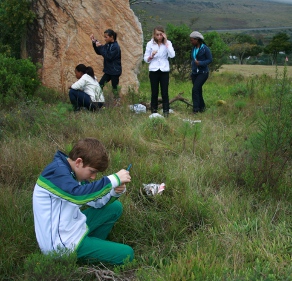Did you know that ants have hair on their heads? Or that some species of ants loot the eggs of other ant species, bringing them back to their own nests and then forcing them into slavery? These were among the fascinating facts that were part of hands-on workshop entitled “Antastic!” held at Scifest Africa by team members of the DST-NRF Centre of Excellence for Invasion Biology’s Iimbovane Outreach Project.
Scifest Africa, South Africa’s national science festival was held from 4 to 10 May in Grahamstown, and participants included Eastern Cape learners from Grade 8 to Grade 10. It is a fun-filled event specially styled to make science, technology, engineering and mathematics accessible to and of interest to everyday people.
It was the first time that the Iimbovane Outreach Project was selected to be part of the 600 Scifest events and activities which includes exhibitions, lectures, hands-on workshops, excursions, laser-shows, quizzes and whiz-bang science shows. Iimbovane is supported by the DST-NRF Centre of Excellence for Invasion Biology (C·I·B) based at Stellenbosch University, and funded by AfriSam, C·I·B and Rand Merchant Bank Fund.
Their workshop, “Antastic!” aimed to teach participants about the ant diversity and the important role they fulfill in the ecosystem. Hands-on activities such as ant hunting, demonstrations and microscopes were all part of the workshop. After learning some basic facts learners were sent outside to hunt for ants for species identification. Participants left no stone unturned and came back with ants from a variety of species. The workshop also gave participants the opportunity to use microscopes and scientific identification keys.
A Grade 9 Life Science educator, Brenda Fineberg, commented: “I enjoyed this one – it’s a nice introduction to the use of microscopes in the biology classroom.”
 The workshop concluded with information about the range of study fields in the biological sciences at Stellenbosch University.
The workshop concluded with information about the range of study fields in the biological sciences at Stellenbosch University.
Mametse Nchabeleng, a Saint Mary’s DSG learner, described her visit to the workshop as weird but very interesting. “Everybody squashes ants, so it’s interesting to know people are actually studying ants and that ants can tell us so much about biodiversity”, she said.
According to Iimbovane Outreach Project manager Dorette du Plessis it was an excellent opportunity to show the South African science education community what is being done at Stellenbosch University, and how the project is helping Western Cape learners to understand biodiversity.
“Antastic” received a prize for “Best Workshop – Outreach” at the festival.